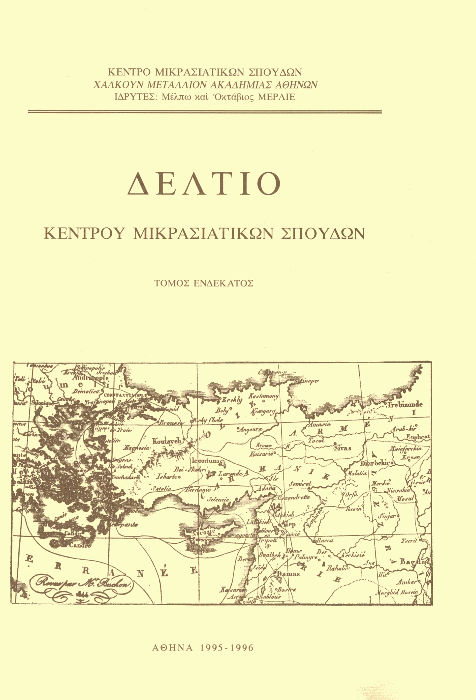Η διάχυση της εθνικής ταυτότητας στις ορθόδοξες κοινότητες της Κιλικίας
Περίληψη
During the first decade of the 20th century the flourishing Greekorthodox
communities in Cilicia were entangled in a bitter conflict with the Patriarchate of
Antioch over the issue of the vacant metropolitan see of Adana and Tarsus. This
conflict, although of ecclesiastical nature, became of critical importance in
forging and diffusing a new form of collective identity in the area. Until the late
19th century religion was the dominant factor shaping the collective identity of
the Greekorthodox communities in Ottoman Cilicia. Orthodoxy ensured the
cohesion of these communities, despite their multilingual and multicultural
character. The predominant language was Turkish although Arabic and Greek
were also in use. Threats to the community’s cohesion were characteristically
identified on the ground of religion. In this respect it was other Christian confessions,
chiefly protestantism, that were regarded as the main challenges of
orthodox identity. Thus both lay and ecclesiastical leaders directed their efforts
against the prosyletizing zeal of western missions.
The conflict with the Patriarchate of Antioch became the catalyst that shifted
traditional allegiances and caused the Orthodox communities to undergo deep
ideological changes. At first, these changes involved a new perception of the
Patriarchate of Antioch. This old guardian of Orthodox Christianity came to be
regarded as an Arab national institution which administered the church in
violation of established practices and the Canon Law. Such a perception perhaps
was not groundless, especially after the election of Meletios Dumani as Patriarch
of Antioch in 1899. Hence the communities declined to accept clerics chosen by
the Patriarch of Antioch for the metropolitan see of Adana and Tarsus and at a
latter stage, demanded its secession from Antioch and its union with the
Patriarchate of Constantinople. Through this conflict Orthodox communities
came increasingly under the influence of nationalism. The once homogenous
Orthodox community was now perceived in national terms and its members were
divided along national lines, as «Arabs» and «Greeks». Though national definitions
of belonging were only gradually accepted, they eventually prevailed National
discourse proved an expedient language for expressing political demands but
in the process existing criteria of collective identity were transformed.
Cultural features such as language acquired a specific national meaning. Since
language was acknowledged as part of national identity, the multilingual profile of
the community became problematic. Linguistic fragmentation, a feature of no
importance in the contex of a religious community, had to be accounted for and
be dealt with Considering the multilingual environment of the community, it
became difficult to promote the status of Greek language without resorting to
specific measures. Thus links with national and educational societies in Greece
were established to spread education in greek. Yet, shifts of meaning were not
limited to language alone. History and perceptions of space were also reinterpreted
in the same way. The complex nature of the Orthodox community was undermined
by historical narratives and geographic references that laid emphasis on
its national character and reinterpreted the history of the region accordingly. By
underlining nationality as the bond of the community, these new interpretations
attempted to establish links strong enough to detach, imaginatively, the Orthodox
communities of Cilicia from their traditional perceptions of community and to
link them with the Greek national community in the Ottoman Empire. Thus
national discourse, despite its rather belated appeareance in relation to an issue of
purely ecclesiastical nature, was succesful in redifining notions of collective
identity and diffusing new understandings of community, language, history and
education.
Λεπτομέρειες άρθρου
- Πώς να δημιουργήσετε Αναφορές
-
Εξερζόγλου Χ. (1995). Η διάχυση της εθνικής ταυτότητας στις ορθόδοξες κοινότητες της Κιλικίας. Δελτίο Κέντρου Μικρασιατικών Σπουδών, 11, 181–238. https://doi.org/10.12681/deltiokms.54
- Τεύχος
- Τόμ. 11 (1995)
- Ενότητα
- Άρθρα

Αυτή η εργασία είναι αδειοδοτημένη υπό το CC Αναφορά Δημιουργού – Μη Εμπορική Χρήση – Παρόμοια Διανομή 4.0.
Οι συγγραφείς των άρθρων που δημοσιεύονται στο Δελτίο διατηρούν τα δικαιώματα πνευματικής ιδιοκτησίας επί των άρθρων τους, δίνοντας στο περιοδικό το δικαίωμα της πρώτης δημοσίευσης. Άρθρα που δημοσιεύονται στο Δελτίο διατίθενται με άδεια Creative Commons 4.0 και σύμφωνα με την άδεια μπορούν να χρησιμοποιούνται ελεύθερα, με αναφορά στο/στη συγγραφέα και στην πρώτη δημοσίευση για μη κερδοσκοπικούς σκοπούς και με δικαίωμα τροποποίησης μόνον με παρόμοια διανομή (αν αναμείξετε, τροποποιήσετε, ή δημιουργήσετε πάνω στο υλικό, πρέπει να διανείμετε τις δικές σας συνεισφορές υπό την ίδια άδεια όπως και το πρωτότυπο).


